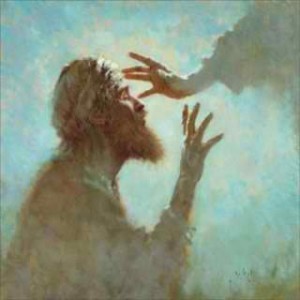 The Example of Blind Bartimaeus
The Example of Blind Bartimaeus
Basic hermeneutics (i.e. the rule by which the meaning of a particular passage are arrived at) are that if all the information is not in a passage, then all the passages on the same subject should be looked at. Or as the theologians like to say the Bible is its own best commentary. For an example, let us look at the story of the healing of Blind Bartimaeus. [Matt 20:29-34; Mark 10:46-52; Luke 18:35-43]
According to Matthew there were two blind men sitting by the roadside, Messiah touched their eyes and they received their sight. Mark informs us that a great crowd with Messiah, there is only one blind man mentioned and he is begging, his name is Bartimaeus the son of Timaeus. Even though the crowd tells him to be quiet Messiah knows he is there and heals him and this time there is no mention of touching him. Luke has only one man and his name is not given. Taken all together we have a complete picture of what happened that day. This is how hermeneutics is to be done.
Except in prophecy, then the dispensationalists throw this rule out, and begin hopping all over the Bible to make some point they hold dear. Disregarding context, and word usage. Recreating the individual meanings into a composite one that is of a fantastical, fearful, and terrorizing future. They hop from Daniel to The Revelation to Matthew to Joel and back again. Never stopping to read the whole passage, only a verse or two. This is cultish behavior.
Olivet Discourse
The sermon in Matt 24 is recorded three other times in scripture. Yet the dispensationalist rarely mention it. Mark 13, Luke 17:22-27 and Luke 21:5-38 are the same teachings as the one in Matthew 24. These four passages known as the Olivet Discourse are about the destruction of Jerusalem, and were fulfilled in 70 AD by the Armies of Rome. They are all limited to that generation that heard the warning.
The only legitimate connection between Daniel and the Olivet Discourse is the Great Prophecy of the coming Messiah and the destruction by the one who makes desolate. (See Also: Daniel 9)
FYI: There is no connection between the Olivet passages and Daniel 11:31, or Dan 12:11. These passages are about different abominations.
Daniel and The Revelation
Daniel is written in two languages. The aramaic sections are largely the history of the imperial nations of the world, i.e. Babylon, Persia, Greece, and Rome. Where the Hebrew sections are largely about the future of the Jewish peoples. Daniel was told to seal the book.
He said, “Go your way, Daniel, for the words are shut up and sealed until the time of the end. Dan. 12:9
The Revelation begins with unsealing the book. Taking up the prophecy were Daniel left off. The reader is given further information about the last of the four great empires, which was Rome.
Then one of the elders said to me, “Weep not; lo, the Lion of the tribe of Judah, the Root of David, has conquered, so that he can open the scroll and its seven seals.” Rev. 5:5
See Also: I am coming Soon
